formerly eScholarship Editions


|
|
|
|
Your request for similar items found 20 book(s). | Modify Search | Displaying 1 - 20 of 20 book(s) | |
| 1. | 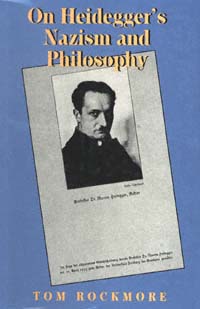 | Title: On Heidegger's Nazism and philosophy Author: Rockmore, Tom 1942- Published: University of California Press, 1991 Subjects: Philosophy | Social and Political Thought | German Studies | Intellectual History Publisher's Description: That Martin Heidegger supported National Socialism has long been common knowledge. Yet the relation between his philosophy and political commitments remains highly contentious and recently has erupted into a vociferous debate. Boldly refuting arguments that the philosopher's political stance was accidental or adopted under coercion, Rockmore argues that Heidegger's philosophical thought and his Nazism are inseparably intertwined, that he turned to National Socialism on the basis of his philosophy, and that his later evolution is largely determined by his continuing concern with Nazism.After developing a framework that clearly outlines the interrelation of Nazism and Heidegger's philosophy, Rockmore analyzes the famous rectoral address the philosopher delivered in 1933 upon becoming rector of the University of Freiburg. In that speech Heidegger sought to ground politics in philosophy. Rockmore examines the inseparable relation of politics and philosophy in Heidegger's Being and Time , the recently published Contributions to Philosophy (written from 1936 to 1938), and the interpretations of Hölderlin, Nietzsche, and technology.In his conclusion Rockmore considers the ongoing discussion of Heidegger's thought and Nazism in France. Combining extensive documentation of the Heidegger controversy with philosophical and historical analysis, this book raises profound questions about the social and political responsibility of philosophy. [brief] Similar Items |
| 2. | 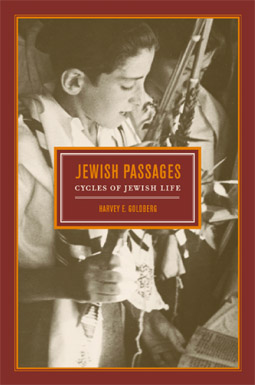 | Title: Jewish passages: cycles of Jewish life Author: Goldberg, Harvey E Published: University of California Press, 2003 Subjects: Jewish Studies | Middle Eastern Studies | Anthropology Publisher's Description: American or Middle Eastern, Ashkenazi or Sephardi, insular or immersed in modern life - however diverse their situations or circumstances, Jews draw on common traditions and texts when they mark life's momentous events and rites of passage. The interplay of past and present, of individual practice and collective identity, emerges as a central fact of contemporary Jewish experience in Harvey E. Goldberg's multifaceted account of how Jews celebrate and observe the cycles of life. A leading anthropologist of Jewish culture, Goldberg draws on his own experience as well as classic sources and the latest research to create a nuanced portrait of Jewish rituals and customs that balances the reality of "ordinary Jews" with the authority of tradition. Looking at classic rites of passage such as circumcision and marriage, along with emerging life-milestone practices like pilgrimage and identity-seeking tourism, Jewish Passages aptly reflects the remarkable cultural and religious diversity within Judaism. This work offers a new view of Jewish culture and history with the individual firmly situated at their center by blending anecdote and historical vignettes with rabbinic, midrashic, and anthropological insights; by exploring Sephardi and Ashkenazi traditions as well as modern ideologies; and by bringing into sharp relief the activities of women and relations with Gentile neighbors. As such, this book provides a unique window on the particulars - and the significance - of personal and communal acts of identification among Jews past, present, and future. [brief] Similar Items |
| 3. | 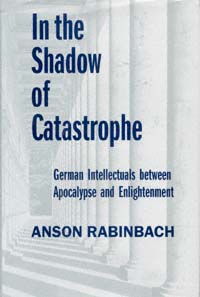 | Title: In the shadow of catastrophe: German intellectuals between apocalypse and enlightenment Author: Rabinbach, Anson Published: University of California Press, 1997 Subjects: History | German Studies | Social and Political Thought | Philosophy Publisher's Description: These essays by eminent European intellectual and cultural historian Anson Rabinbach address the writings of key figures in twentieth-century German philosophy. Rabinbach explores their ideas in relation to the two world wars and the horrors facing Europe at that time.Analyzing the work of Benjamin and Bloch, he suggests their indebtedness to the traditions of Jewish messianism. In a discussion of Hugo Ball's little-known Critique of the German Intelligentsia , Rabinbach reveals the curious intellectual career of the Dadaist and antiwar activist turned-nationalist and anti-Semite. His examination of Heidegger's "Letter on Humanism" and Jaspers's The Question of German Guilt illuminates the complex and often obscure political referents of these texts. Turning to Horkheimer and Adorno's Dialectic of Enlightenment , Rabinbach offers an arresting new interpretation of this central text of the critical theory of the Frankfurt School. Subtly and persuasively argued, his book will become an indispensable reference point for all concerned with twentieth-century German history and thought. [brief] Similar Items |
| 4. | 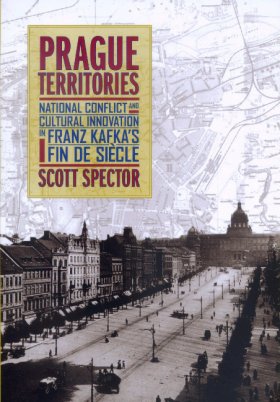 | Title: Prague territories: national conflict and cultural innovation in Franz Kafka's fin de siècle Author: Spector, Scott 1959- Published: University of California Press, 2002 Subjects: History of Food | European History | Jewish Studies | European Studies Publisher's Description: Scott Spector's adventurous cultural history maps for the first time the "territories" carved out by German-Jewish intellectuals living in Prague at the dawn of the twentieth century. Spector explores the social, cultural, and ideological contexts in which Franz Kafka and his contemporaries flourished, revealing previously unseen relationships between politics and culture. His incisive readings of a broad array of German writers feature the work of Kafka and the so-called "Prague circle" and encompass journalism, political theory, Zionism, and translation as well as literary program and practice. With the collapse of German-liberal cultural and political power in the late-nineteenth-century Habsburg Empire, Prague's bourgeois Jews found themselves squeezed between a growing Czech national movement on the one hand and a racial rather than cultural conception of Germanness on the other. Displaced from the central social and cultural position they had come to occupy, the members of the "postliberal" Kafka generation were dazzlingly productive and original, far out of proportion to their numbers. Seeking a relationship between ideological crisis and cultural innovation, Spector observes the emergence of new forms of territoriality. He identifies three fundamental areas of cultural inventiveness related to this Prague circle's political and cultural dilemma. One was Expressionism, a revolt against all limits and boundaries, the second was a spiritual form of Zionism incorporating a novel approach to Jewish identity that seems to have been at odds with the pragmatic establishment of a Jewish state, and the third was a sort of cultural no-man's-land in which translation and mediation took the place of "territory." Spector's investigation of these areas shows that the intensely particular, idiosyncratic experience of German-speaking Jews in Prague allows access to much broader and more general conditions of modernity. Combining theoretical sophistication with a refreshingly original and readable style, Prague Territories illuminates some early signs of a contemporary crisis from which we have not yet emerged. [brief] Similar Items |
| 5. | 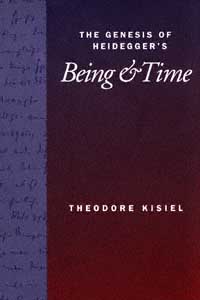 | Title: The genesis of Heidegger's Being and time Author: Kisiel, Theodore J Published: University of California Press, 1995 Subjects: Philosophy | Social and Political Thought | German Studies Publisher's Description: This book, ten years in the making, is the first factual and conceptual history of Martin Heidegger's Being and Time (1927), a key twentieth-century text whose background until now has been conspicuously absent. Through painstaking investigation of European archives and private correspondence, Theodore Kisiel provides an unbroken account of the philosopher's early development and progress toward his masterwork.Beginning with Heidegger's 1915 dissertation, Kisiel explores the philosopher's religious conversion during the bleak war years, the hermeneutic breakthrough in the war-emergency semester of 1919, the evolution of attitudes toward his phenomenological mentor, Edmund Husserl, and the shifting orientations of the three drafts of Being and Time . Discussing Heidegger's little-known reading of Aristotle, as well as his last-minute turn to Kant and to existentialist terminology, Kisiel offers a wealth of narrative detail and documentary evidence that will be an invaluable factual resource for years to come.A major event for philosophers and Heidegger specialists, the publication of Kisiel's book allows us to jettison the stale view of Being and Time as a great book "frozen in time" and instead to appreciate the erratic starts, finite high points, and tentative conclusions of what remains a challenging philosophical "path."This is the first factual and conceptual history of Martin Heidegger's Being and Time (1927), a key twentieth-century text whose background until now has been conspicuously absent. Through painstaking investigation of European archives and private correspondence, Kisiel provides an unbroken account of the philosopher's early development and progress toward his masterwork. [brief] Similar Items |
| 6. | 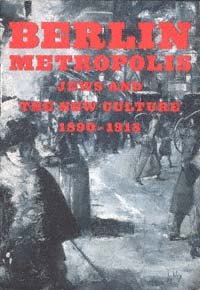 | Title: Berlin metropolis: Jews and the new culture, 1890-1918 Author: Bilski, Emily D 1956- Published: University of California Press, 2000 Subjects: Art | History | Jewish Studies | German Studies Publisher's Description: Between 1890 and 1918 the city of Berlin evolved into a commercial and industrial hub that also became an international center for radical new ideas in the visual, performing, and literary arts. Jews were key leaders in developing this unique cosmopolitan culture. Berlin Metropolis: Jews and the New Culture, 1890-1918 vividly documents the many ways that Jewish artists and entrepreneurs participated in this burst of artistic creativity and promoted the emergence of modernism on the international scene.The book and exhibition at The Jewish Museum highlight leading cultural figures such as Max Liebermann, a founder of the Berlin Secession, and Herwarth Walden, who founded Der Sturm; artists such as Ludwig Meidner and Jakob Steinhardt; pioneers of cabaret, theater, and film, including Max Reinhardt and Ernst Lubitsch; art dealers, publishers, and writers; and leading intellectual and political figures such as Martin Buber and Georg Simmel. These and other fascinating individuals are represented by more than 200 diverse objects: paintings, sculpture, drawings, prints, books, letters, posters, graphic arts, theater memorabilia, and film. The book includes eight essays by scholars of German and Jewish culture and art history that provide a truly interdisciplinary interpretation of the Berlin renaissance.The period represented in Berlin Metropolis was a time when Jews were traditionally restricted from participating in major areas of German public life such as the army, government, and the university. But by turning to the "alternative public spheres" characteristic of urban society - galleries, cafés, journals, theaters, cabarets - they emerged as innovative cultural leaders whose intellectual and artistic impact is still felt today.The exhibition, Berlin Metropolis: Jews and the New Culture, 1890-1918 , will be at The Jewish Museum, New York , from November 14, 1999, to March 5, 2000; and the Norton Museum of Art, West Palm Beach, Florida , from April 1 to June 11, 2000. [brief] Similar Items |
| 7. | 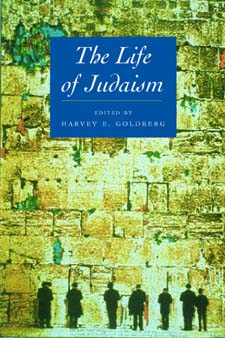 | Title: The life of Judaism Author: Goldberg, Harvey E Published: University of California Press, 2001 Subjects: Religion | Jewish Studies | Judaism Publisher's Description: Approximately thirteen million people around the world define themselves as Jews, with the majority residing in the United States and Israel. This collection portrays the diversity of Jewish experience as it is practiced and lived in contemporary societies. The book's attention to material culture offers a much-needed addition to more traditional views advanced in the study of Judaism. Through ethnographic and autobiographical perspectives, the essays provide an appreciation of Judaism in daily activities, from domestic food preparation to worshipping; Jewish attachment to the cultures of specific communities, be they in Russia or Morocco; the impact of the Holocaust; the place of the State of Israel in Jewish life; and the role of women. Harvey E. Goldberg, a leading scholar in the anthropology of Judaism, provides an introduction to each chapter that demonstrates the links among the various themes. Ease of communication and travel has resulted in frequent contact--and at times, conflict--between Jews of similar and diverging backgrounds around the world. Visiting distinctive Jewish spaces has become a way of cultivating specific identities and senses of a Jewish past. As ritual, prayers, and attitudes toward authority undergo new constructions and interpretation, Judaism of "the book" also takes on new forms. These essays go a long way in helping us understand a contemporary and multifaceted Judaism, along with its history and texts. [brief] Similar Items |
| 8. |  | Title: Historical destiny and national socialism in Heidegger's "Being and time" Author: Fritsche, Johannes Published: University of California Press, 1999 Subjects: Philosophy | German Studies | Intellectual History Publisher's Description: There has been much debate over the relationship of Heidegger's philosophy - in particular his book Being and Time - to his practical involvement with National Socialism. Yet the question has never been addressed through a comparison of Being and Time with other texts on history and politics written at the time. Johannes Fritsche does this, providing a detailed interpretation of the relevant passages in Being and Time - especially sections 72-77 on fate, community, and society. He analyzes for comparison two other authors who explicitly regarded themselves as rightists - Adolf Hitler ( Mein Kampf ) and Max Scheler ( Formalism in Ethics and other writings) - and two authors on the left - Georg Lukács ( History and Class Consciousness ) and Paul Tillich ( The Socialist Decision ).Fritsche concludes that Being and Time is a brilliant summary of right-wing politics in general, which proposes the destruction of liberal society in order to regenerate an idealized community. In addition, Heidegger rejects positions on the right, such as Scheler's, that enabled their authors to distance themselves from the most extreme political rightists, and thus he paves the way for National Socialism. Being and Time , Fritsche demonstrates, must be seen as a clear case for the National Socialists and their project of revitalization of the Volksgemeinschaft , the community of the people. [brief] Similar Items |
| 9. | 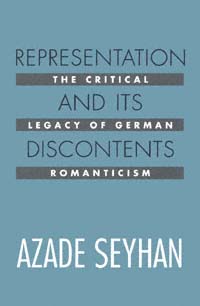 | Title: Representation and its discontents: the critical legacy of German romanticism Author: Seyhan, Azade Published: University of California Press, 1992 Subjects: Philosophy | Literary Theory and Criticism | German Studies Publisher's Description: Azade Seyhan provides a concise, elegantly argued introduction to the critical theory of German Romanticism and demonstrates how its approach to the metaphorical and linguistic nature of knowledge is very much alive in contemporary philosophy and literary theory. Her analysis of key thinkers such as Friedrich Schlegel and Novalis explores their views on rhetoric, systematicity, hermeneutics, and cultural interpretation. Seyhan examines German Romanticism as a critical intervention in the debates on representation, which developed in response to the philosophical revolution of German Idealism.Facing a chaotic political and intellectual landscape, the eighteenth-century theorists sought new models of understanding and new objectives for criticism and philosophy. Representation and Its Discontents identifies the legacy of this formative moment in modern criticism and suggests its relevance to contemporary discussions of post-structuralism, orientalism, theories of textuality, and the nature of philosophical discourse. [brief] Similar Items |
| 10. | 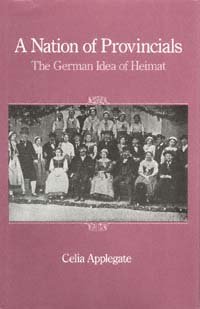 | Title: A nation of provincials: the German idea of Heimat Author: Applegate, Celia Published: University of California Press, 1990 Subjects: History | European History | German Studies Publisher's Description: At the center of this pioneering work in modern European history is the German word Heimat - the homeland, the local place. Translations barely penetrate the meaning of the word, which has provided the emotional and ideological common ground for a variety of associations and individuals devoted to the cause of local preservation. Celia Applegate examines at both the national and regional levels the cultural meaning of Heimat and why it may be pivotal to the troubled and very timely question of German identity.The ideas and activities clustered around Heimat shed new light particularly on problems of modernization. Instead of viewing the Germans as a dangerously anti-modern people, Applegate argues that they used the cultivation of Heimat to ground an abstract nationalism in their attachment to familiar places and to reconcile the modern industrial and urban world with the rural landscapes and customs they admired. Primarily a characteristic of the middle classes, love of Heimat constituted an alternative vision of German unity to the familiar aggressive, militaristic one. The Heimat vision of Germany emphasized cultural diversity and defined German identity by its internal members rather than its external enemies.Applegate asks that we re-examine the continuities of German history from the perspective of the local places that made up Germany, rather than from that of prominent intellectuals or national policymakers. The local patriotism of Heimat activists emerges as an element of German culture that persisted across the great divides of 1918, 1933, and 1945. She also suggests that this attachment to a particular place is a feature of Europeans in general and is deserving of further attention. [brief] Similar Items |
| 11. | 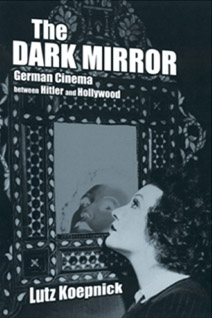 | Title: The dark mirror: German cinema between Hitler and Hollywood Author: Koepnick, Lutz P. (Lutz Peter) Published: University of California Press, 2002 Subjects: Cinema and Performance Arts | German Studies | Music | Film Publisher's Description: Lutz Koepnick analyzes the complicated relationship between two cinemas - Hollywood's and Nazi Germany's - in this theoretically and politically incisive study. The Dark Mirror examines the split course of German popular film from the early 1930s until the mid 1950s, showing how Nazi filmmakers appropriated Hollywood conventions and how German film exiles reworked German cultural material in their efforts to find a working base in the Hollywood studio system. Through detailed readings of specific films, Koepnick provides a vivid sense of the give and take between German and American cinema. [brief] Similar Items |
| 12. | 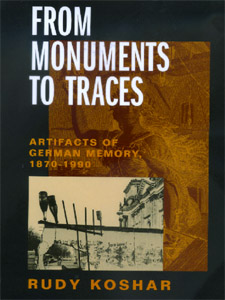 | Title: From monuments to traces: artifacts of German memory, 1870-1990 Author: Koshar, Rudy Published: University of California Press, 2000 Subjects: German Studies | History | Architectural History | European History Publisher's Description: Rudy Koshar constructs a powerful framework in which to examine the subject of German collective memory, which for more than a half century has been shaped by the experience of Nazism, World War II, and the Holocaust. Finding the assumptions of many writers and scholars shortsighted, Koshar surveys the evidence of postwar German memory in the context of previous traditions. From Monuments to Traces follows the evolution of German "memory landscapes" all the way from national unification in 1870-71 through the world wars and political division to reunification in 1990. The memory landscapes of any society may incorporate monuments, historical buildings, memorials and cemeteries, battlefields, streets, or natural environments that foster shared memories of important events or personalities. They may also be designed to divert public attention from embarrassing or traumatic histories. Koshar argues that in Germany, memory landscapes have taken shape according to four separate paradigms--the national monument, the ruin, the reconstruction, and the trace--which he analyzes in relation to the changing political agendas that have guided them over time. Despite the massive ruptures of Germany's history, we see that significant continuities have served to counterbalance the traumas of the German past. [brief] Similar Items |
| 13. | 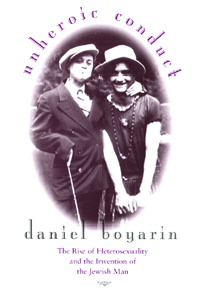 | Title: Unheroic conduct: the rise of heterosexuality and the invention of the Jewish man Author: Boyarin, Daniel Published: University of California Press, 1997 Subjects: Gender Studies | Jewish Studies | Social Theory Publisher's Description: In a book that will both enlighten and provoke, Daniel Boyarin offers an alternative to the prevailing Euroamerican warrior/patriarch model of masculinity and recovers the Jewish ideal of the gentle, receptive male. The Western notion of the aggressive, sexually dominant male and the passive female reaches back through Freud to Roman times, but as Boyarin makes clear, such gender roles are not universal. Analyzing ancient and modern texts, he reveals early rabbis - studious, family-oriented - as exemplars of manhood and the prime objects of female desire in traditional Jewish society.Challenging those who view the "feminized Jew" as a pathological product of the Diaspora or a figment of anti-Semitic imagination, Boyarin argues that the Diaspora produced valuable alternatives to the dominant cultures' overriding gender norms. He finds the origins of the rabbinic model of masculinity in the Talmud, and though unrelentingly critical of rabbinic society's oppressive aspects, he shows how it could provide greater happiness for women than the passive gentility required by bourgeois European standards.Boyarin also analyzes the self-transformation of three iconic Viennese modern Jews: Sigmund Freud, the father of psychoanalysis; Theodor Herzl, the founder of Zionism; and Bertha Pappenheim (Anna O.), the first psychoanalytic patient and founder of Jewish feminism in Germany. Pappenheim is Boyarin's hero: it is she who provides him with a model for a militant feminist, anti-homophobic transformation of Orthodox Jewish society today.Like his groundbreaking Carnal Israel , this book is talmudic scholarship in a whole new light, with a vitality that will command attention from readers in feminist studies, history of sexuality, Jewish culture, and the history of psychoanalysis. [brief] Similar Items |
| 14. | 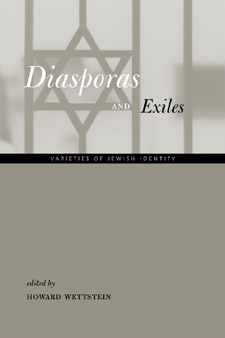 | Title: Diasporas and exiles: varieties of Jewish identity Author: Wettstein, Howard Published: University of California Press, 2002 Subjects: Jewish Studies | European History | Social and Political Thought | Sociology | Immigration Publisher's Description: Diaspora, considered as a context for insights into Jewish identity, brings together a lively, interdisciplinary group of scholars in this innovative volume. Readers needn't expect, however, to find easy agreement on what those insights are. The concept "diaspora" itself has proved controversial; galut, the traditional Hebrew expression for the Jews' perennial condition, is better translated as "exile." The very distinction between diaspora and exile, although difficult to analyze, is important enough to form the basis of several essays in this fine collection. "Identity" is an even more elusive concept. The contributors to Diasporas and Exiles explore Jewish identity - or, more accurately, Jewish identities - from the mutually illuminating perspectives of anthropology, art history, comparative literature, cultural studies, German history, philosophy, political theory, and sociology. These contributors bring exciting new emphases to Jewish and cultural studies, as well as the emerging field of diaspora studies. Diasporas and Exiles mirrors the richness of experience and the attendant virtual impossibility of definition that constitute the challenge of understanding Jewish identity. [brief] Similar Items |
| 15. | 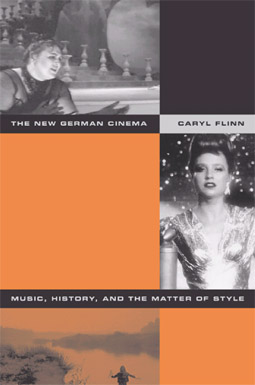 | Title: The new German cinema: music, history, and the matter of style Author: Flinn, Caryl Published: University of California Press, 2003 Subjects: Cinema and Performance Arts | German Studies | Music Publisher's Description: When New German cinema directors like R. W. Fassbinder, Ulrike Ottinger, and Werner Schroeter explored issues of identity - national, political, personal, and sexual - music and film style played crucial roles. Most studies of the celebrated film movement, however, have sidestepped the role of music, a curious oversight given its importance to German culture and nation formation. Caryl Flinn's study reverses this trend, identifying styles of historical remembrance in which music participates. Flinn concentrates on those styles that urge listeners to interact with difference - including that embodied in Germany's difficult history - rather than to "master" or "get past" it. Flinn breaks new ground by considering contemporary reception frameworks of the New German Cinema, a generation after its end. She discusses transnational, cultural, and historical contexts as well as the sexual, ethnic, national, and historical diversity of audiences. Through detailed case studies, she shows how music helps filmgoers engage with a range of historical subjects and experiences. Each chapter of The New German Cinema examines a particular stylistic strategy, assessing music's role in each. The study also examines queer strategies like kitsch and camp and explores the movement's charged construction of human bodies on which issues of ruination, survival, memory, and pleasure are played out. [brief] Similar Items |
| 16. | 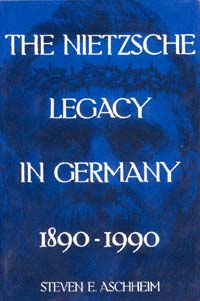 | Title: The Nietzsche legacy in Germany, 1890-1990 Author: Aschheim, Steven E 1942- Published: University of California Press, 1994 Subjects: German Studies | Intellectual History | Social and Political Thought | Politics | German Studies Publisher's Description: Countless attempts have been made to appropriate the ideas of Friedrich Nietzsche for diverse cultural and political ends, but nowhere have these efforts been more sustained and of greater consequence than in Germany. Aschheim offers a magisterial chronicle of the philosopher's presence in German li . . . [more] Similar Items |
| 17. | 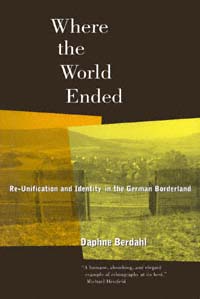 | Title: Where the world ended: re-unification and identity in the German borderland Author: Berdahl, Daphne 1964- Published: University of California Press, 1999 Subjects: Anthropology | Cultural Anthropology | German Studies | Geography | European Studies | Social Problems Publisher's Description: When the Berlin Wall fell, people who lived along the dismantled border found their lives drastically and rapidly transformed. Daphne Berdahl, through ongoing ethnographic research in a former East German border village, explores the issues of borders and borderland identities that have accompanied the many transitions since 1990. What happens to identity and personhood, she asks, when a political and economic system collapses overnight? How do people negotiate and manipulate a liminal condition created by the disappearance of a significant frame of reference?Berdahl concentrates especially on how these changes have affected certain "border zones" of daily life - including social organization, gender, religion, and nationality - in a place where literal, indeed concrete, borders were until recently a very powerful presence. Borders, she argues, are places of ambiguity as well as of intense lucidity; these qualities may in fact be mutually constitutive. She shows how, in a moment of headlong historical transformation, larger political, economic, and social processes are manifested locally and specifically. In the process of a transition between two German states, people have invented, and to some extent ritualized, cultural practices that both reflect and constitute profound identity transformations in a period of intense social discord. Where the World Ended combines a vivid ethnographic account of everyday life under socialist rule and after German reunification with an original investigation of the paradoxical human condition of a borderland. [brief] Similar Items |
| 18. | 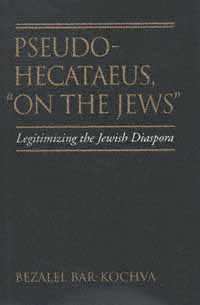 | Title: Pseudo-Hecataeus, On the Jews: legitimizing the Jewish diaspora Author: Bar-Kochva, Bezalel Published: University of California Press, 1997 Subjects: Jewish Studies | History | Ancient History | Jewish Studies Publisher's Description: Debate over the authenticity of "On the Jews" has persisted for nearly 1,900 years. Bezalel Bar-Kochva attempts to overcome this stalemate in his finely detailed and convincingly argued study that proves the forgery of the book and suggests not only a source for the text, but also a social, political, and cultural setting that explains its conception.Bar-Kochva argues that the author of this treatise belonged to the moderate conservative Jews of Alexandria, whose practices were contrary to the contemporary trends of Hellenistic Judaism. They rejected the application of Greek philosophy and allegorical interpretations of the Holy scriptures and advocated the use of Pentateuch Hebrew as the language for educating and for religious services. They showed a keen interest in Judea and identified themselves with the Jews of the Holy Land. "On the Jews," then, was the manifesto of this group and was written at the peak period of the Hasmonean kingdom. Its main purpose was to legitimize Jewish residence in Egypt, despite being explicitly prohibited in the Pentateuch, and to justify the continued residence of Jews there in a time of prosperity and expansion of the Jewish independent state. [brief] Similar Items |
| 19. | 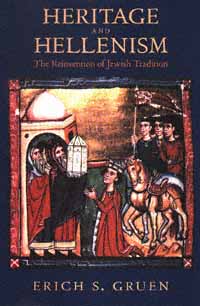 | Title: Heritage and hellenism: the reinvention of Jewish tradition Author: Gruen, Erich S Published: University of California Press, 1998 Subjects: Classics | Classical History | Classical Religions | Judaism | Ancient History | Jewish Studies Publisher's Description: The interaction of Jew and Greek in antiquity intrigues the imagination. Both civilizations boasted great traditions, their roots stretching back to legendary ancestors and divine sanction. In the wake of Alexander the Great's triumphant successes, Greeks and Macedonians came as conquerors and settled as ruling classes in the lands of the eastern Mediterranean. Hellenic culture, the culture of the ascendant classes in many of the cities of the Near East, held widespread attraction and appeal. Jews were certainly not immune. In this thoroughly researched, lucidly written work, Erich Gruen draws on a wide variety of literary and historical texts of the period to explore a central question: How did the Jews accommodate themselves to the larger cultural world of the Mediterranean while at the same time reasserting the character of their own heritage within it? Erich Gruen's work highlights Jewish creativity, ingenuity, and inventiveness, as the Jews engaged actively with the traditions of Hellas, adapting genres and transforming legends to articulate their own legacy in modes congenial to a Hellenistic setting. Drawing on a diverse array of texts composed in Greek by Jews over a broad period of time, Gruen explores works by Jewish historians, epic poets, tragic dramatists, writers of romance and novels, exegetes, philosophers, apocalyptic visionaries, and composers of fanciful fables - not to mention pseudonymous forgers and fabricators. In these works, Jewish writers reinvented their own past, offering us the best insights into Jewish self-perception in that era. [brief] Similar Items |
| 20. | 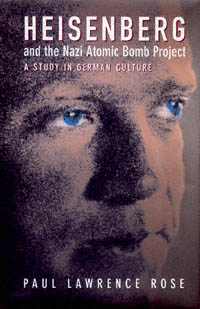 | Title: Heisenberg and the Nazi atomic bomb project: a study in German culture Author: Rose, Paul Lawrence Published: University of California Press, 1998 Subjects: History | European History | German Studies | European Studies | Science | Technology and Society | Physics | History and Philosophy of Science Publisher's Description: No one better represents the plight and the conduct of German intellectuals under Hitler than Werner Heisenberg, whose task it was to build an atomic bomb for Nazi Germany. The controversy surrounding Heisenberg still rages, because of the nature of his work and the regime for which it was undertaken. What precisely did Heisenberg know about the physics of the atomic bomb? How deep was his loyalty to the German government during the Third Reich? Assuming that he had been able to build a bomb, would he have been willing? These questions, the moral and the scientific, are answered by Paul Lawrence Rose with greater accuracy and breadth of documentation than any other historian has yet achieved.Digging deep into the archival record among formerly secret technical reports, Rose establishes that Heisenberg never overcame certain misconceptions about nuclear fission, and as a result the German leaders never pushed for atomic weapons. In fact, Heisenberg never had to face the moral problem of whether he should design a bomb for the Nazi regime. Only when he and his colleagues were interned in England and heard about Hiroshima did Heisenberg realize that his calculations were wrong. He began at once to construct an image of himself as a "pure" scientist who could have built a bomb but chose to work on reactor design instead. This was fiction, as Rose demonstrates: in reality, Heisenberg blindly supported and justified the cause of German victory. The question of why he did, and why he misrepresented himself afterwards, is answered through Rose's subtle analysis of German mentality and the scientists' problems of delusion and self-delusion. This fascinating study is a profound effort to understand one of the twentieth century's great enigmas. [brief] Similar Items |